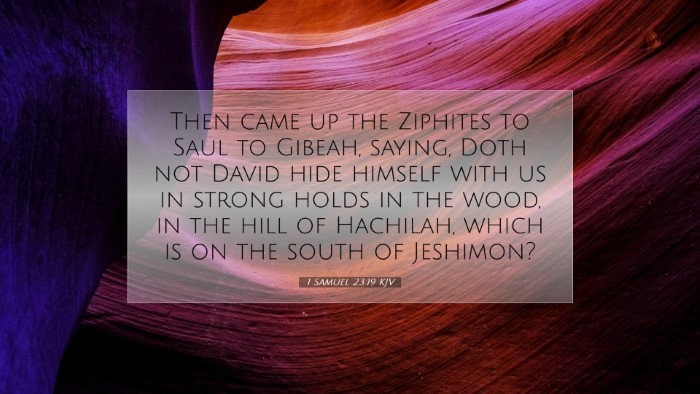Commentary on 1 Samuel 23:19
Verse Context: 1 Samuel 23:19 reads: "Then came up the Ziphites to Saul to Gibeah, saying, Doth not David hide himself with us in strong holds at Horesh, in the wood, in the hill of Hachilah, which is on the south of Jeshimon?" This verse captures a moment of tension and intrigue during the life of David as he evades King Saul’s relentless pursuit.
Introduction
The narrative in 1 Samuel is rich with themes of loyalty, betrayal, and divine providence. The Ziphites’ actions serve as a significant turning point, emphasizing human treachery against God's anointed. This commentary synthesizes insights from Matthew Henry, Albert Barnes, and Adam Clarke to provide a comprehensive understanding of the spiritual and theological implications of this passage.
Insights from Public Domain Commentaries
Matthew Henry’s Commentary
Matthew Henry highlights the hostility faced by David from his own people, the Ziphites. He notes that their betrayal serves as a stark reminder of the depths of ingratitude, particularly when people turn against their rightful leader out of fear and ambition. Henry points out that:
- Division Among Israel: The Ziphites’ intelligence to Saul indicates a rift in Israel, where the king’s personal vendetta against David generates a civil conflict.
- Human Duplicity: Their willingness to betray David demonstrates the frailty of human loyalty, particularly in the face of authority and power.
- God’s Providence: Despite their efforts to assist Saul, Henry emphasizes that God’s providential care is evident in David’s continued survival, underscoring that divine purposes prevail over human schemes.
Albert Barnes’ Commentary
Albert Barnes provides a detailed analysis of the geographical elements mentioned in the verse, which can be crucial in understanding the dynamics at play:
- Strategic Location: Barnes points out that the locations mentioned (like Horesh and Hachilah) provide advantageous hiding spots for David, showing God's guidance in helping him evade Saul’s pursuit.
- Political Motivations: The Ziphites' motivations are examined; they may have wished to curry favor with Saul or secure their own safety by offering intelligence, demonstrating a desire for self-preservation that often overrides moral integrity.
- Covenant Implications: Barnes suggests that this betrayal of David has implications not just for David himself, but for the covenant community, reflecting how personal ambitions can undermine communal destiny.
Adam Clarke’s Commentary
Adam Clarke emphasizes the importance of the Ziphites in the larger story of David and Saul:
- Historical Context: Clarke places the Ziphites within the broader historical and theological framework of Israel’s monarchy, analyzing how their allegiance shifts reflect the tensions within Israel's leadership dynamics.
- Ethical Reflection: He challenges readers to consider the ethical implications of betrayal and its consequences on relationships within the community of faith. The Ziphites' actions serve as a cautionary tale against compromising integrity for positional gains.
- Divine Justice: Clarke concludes with a reflection on divine justice, positing that although betrayal might seem to gain immediate advantages, ultimately, God’s justice will be served against those who act treacherously against His anointed.
Theological Reflections
1 Samuel 23:19 is more than just a historical account; it encapsulates profound theological reflections applicable to contemporary faith communities:
- The Nature of Leadership: The passage raises critical questions about what it means to lead in faithfulness and integrity in the face of adversity.
- Human Betrayal: It serves to remind believers that betrayal can often come from unexpected sources, including those closest to them, necessitating vigilance and reliance on God.
- God’s Sovereignty: The passage reassures believers of God's sovereign control over situations of human betrayal, affirming that God can work through even the direst circumstances for His glory and the ultimate good of His people.
Application for Today
This verse and its commentary underscore several points for modern readers:
- Betrayal in Leadership: Leaders today should be mindful of the fragile nature of loyalty, and like David, remain grounded in faith amidst accusations and betrayal.
- Community Dynamics: This passage can lead to discussions about community dynamics and the importance of integrity and allegiance in the body of Christ.
- Trust in Divine Timing: Finally, it reinforces the importance of trusting in God’s timing and manner of deliverance, encouraging believers to look beyond immediate circumstances for divine intervention.
Conclusion
1 Samuel 23:19 illustrates the complexities of leadership, loyalty, and divine providence. By synthesizing insights from respected commentaries, we are reminded of the timeless relevance of Scripture. As we reflect on the Ziphites' betrayal, we are called to higher standards of integrity and faithfulness in our own lives, recognizing that God remains sovereign even amid human failure.


